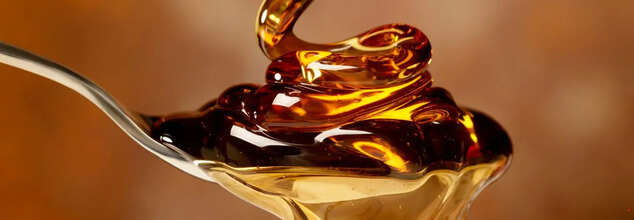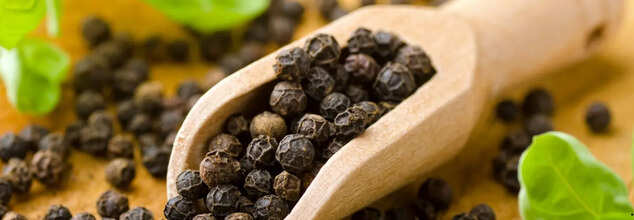
Credit: Canva
What Is Golden Syrup? How Does It Compare To Other Sweeteners?
I was reading the labels on my cookies when I discovered a new ingredient. I had never heard of golden syrup before, and the name itself was too intriguing. Golden syrup was supposed to be sweet yet not be corn syrup. So I took out my phone to dig deeper into it, and this is what I found.
Golden Syrup Is Amber-Coloured Liquid
Golden syrup is a thick, amber-colored liquid with a smooth consistency similar to honey and a distinct caramel-like flavor. Despite its resemblance to maple syrup, golden syrup has a richer, buttery taste. As per health experts, golden syrup is a form of light treacle, a byproduct of sugar refining.
Treacle comes in two varieties—black and light. Black treacle has a robust, bittersweet taste, while the lighter version—golden syrup—is more widely used. Intrestingly, this sweetener even made its way into pop culture, featuring in the Harry Potter series as the key ingredient in Harry’s favorite dessert, treacle tart.
ALSO READ: These Yoga Poses Can Help If You Are Struggling To Get A Good Night's Sleep
How Is Golden Syrup Made?
Golden syrup is produced by partially breaking down sucrose into glucose and fructose through heat and citric acid, resulting in a smooth, sweet syrup. One of the most well-known brands, Lyle’s Golden Syrup, holds a Guinness World Record for having the world's oldest unchanged packaging since 1885.
Are Golden Syrup And Corn Syrup Same?
Although golden syrup is a staple in British and European kitchens, it has also gained popularity in Australia and New Zealand. In regions where it is less common, such as the United States, homemade versions can be made using sugar, water, and citric acid.
Some compare golden syrup to corn syrup, but the two differ in production. "Corn syrup is made from cornstarch, whereas golden syrup comes from sugar," explains Zeratsky. While golden syrup is sometimes labeled as "light treacle" in the U.S., it is not widely available in grocery stores. In recipes, molasses is often used as a substitute due to its similar texture and flavor.
Is Golden Syrup A Healthier Sweetener Than Others?
Like other liquid sweeteners such as corn syrup and molasses, golden syrup offers little nutritional value. "It is essentially sugar in syrup form, so it should be treated like any other added sugar," Jill Weisenberger, a Virginia-based registered dietitian and author of Prediabetes: A Complete Guide, told NYPost.Health experts emphasize moderation when consuming added sugars. The US Food and Drug Administration (FDA) advises limiting added sugar intake to no more than 50 grams (about 12 teaspoons) per day based on a 2,000-calorie diet, while the American Heart Association recommends even less.
"Although golden syrup is a common ingredient in traditional recipes, excessive consumption of any sweetener can contribute to weight gain and increase the risk of conditions like type 2 diabetes and heart disease," warns nutrition consultant Jen Messer. "The key is moderation."
Whether in tea, desserts, or baked goods, golden syrup remains a beloved sweetener. However, like all added sugars, it’s best enjoyed in controlled amounts to support overall health.
ALSO READ: Has The Black Death Returned? List Of Dreadful Symptoms Of The Bubonic Plague Amidst The Scare In UK

Image Credits: Canva
Can Homeopathy Really Detox Your Body? Expert Weigh In
Detoxification is the body's natural cleansing process of eliminating dangerous toxins that have built up from environmental toxins, poor diets, and stress. It cleanses the blood, liver, and other organs involved in the process of waste elimination. While mainstream detoxing processes usually consist of rigid diets, fasting, or colon cleanses, homeopathy offers a softer and holistic means of stimulating the body's own cleansing processes.
The new lifestyle has contributed immensely to changed eating patterns, resulting in increased chronic conditions of obesity, diabetes, and heart diseases. Toxins penetrate the body in the form of processed foods, alcohol, pollution, and stress. They become part of the blood and lymphatic system, slowly accumulating in essential organs such as the liver, kidneys, and intestines. These toxins, if not efficiently eliminated, can result in fatigue, gastrointestinal discomfort, skin ailments, and compromised immunity.
The liver is the primary organ for detoxification. Through the process of metabolism, the Phase 1 detoxification of the liver (also referred to as the P450 enzyme system) creates free radicals, which can cause tissue damage if there are not adequate antioxidants within the body. This is why dietary or supplement replenishment of antioxidants is important in order to detoxify efficiently.
Can Homeopathy Naturally Detox?
As opposed to traditional detox routines that are hard on the body, homeopathy acts on the cellular level to complement the body's inherent capacity for detoxification. According to Dr. Manju Singh, Homeopathy expert, homeopathy does not cleanse but instead 'drains' toxins, and that it activates the body's defense mechanisms, allowing toxins to be removed effectively without an interruption in overall health.
Homeopathic Remedies for Detoxification
Nux Vomica: Perfect for detoxifying after binge drinking, caffeine, or fast foods. Alleviates bloating, nausea, and stomach discomfort.
Lycopodium: Facilitates liver function and eliminates digestive problems such as gas, bloating, and acidity.
Sulphur: Famous for purifying the skin, it clears acne, eczema, and rashes due to toxin accumulation.
Berberis Vulgaris: Maintains kidney health by facilitating the elimination of toxins through urine, keeping kidney-related diseases at bay.
Chelidonium Majus: Supports liver functioning, digestion, and fat digestion without any effort.
Why Lifestyle Plays an Important Role in Detoxification?
Though homeopathy is a strong supporter of detoxification, healthy lifestyle also plays a similar role. The inclusion of the following habits can make the body most effective in natural toxin removal:
1. Hydration
Adequate intake of water is essential to flush out toxins in the form of urine and sweat. Herbal teas and fresh juices can also aid in hydration and detoxification.
2. Nutrient-Dense Diet
A well-balanced diet that includes plenty of fruits, vegetables, whole grains, and fiber feeds the body while encouraging toxin elimination. Cutting down on processed foods, alcohol, and excessive caffeine consumption further aids detoxification.
3. Consistent Physical Exercise
Exercise increases blood circulation, strengthens digestion, and activates the lymphatic system, which helps remove toxins through sweat and breath.
4. Stress Control
Ongoing stress may lead to increased toxin accumulation in the body. Stress levels can be controlled through deep breathing techniques, meditation, and yoga, which further benefit overall health.
5. Reducing Chemical Exposure
Restricting exposure to environmental toxins, including air pollution, artificial cleaning agents, and pesticides, reduces the toxin load on the body.
Homeopathy may provide a holistic and natural means of detoxification, removing toxins from the body without harm while restoring equilibrium. A visit to a qualified homeopathic practitioner guarantees a personalized detox program suited to individual needs, making the process safe, effective, and sustainable.
Dr. Manju Singh, B.H.M.S., Homeopathy Consultant and senior homeopathic medical officer at SBL Global, India

Credit: Canva
How To Use Black Pepper For Weight Loss
Spices are the heart of Indian cuisine, adding depth and distinct flavors to dishes. Besides that, they are also hold strong medicinal value. One such widely used spice is black pepper, also known as Kali mirch. Its bold aroma and sharp taste can instantly elevate any dish, making it an essential ingredient in Indian cooking. But beyond enhancing flavor, this common kitchen staple is also a natural fat burner.
How Does Balck Pepper Aid Weight Loss?
Black pepper contains piperine, a bioactive compound known for boosting metabolism and preventing fat accumulation in the body. Additionally, it enhances the concentration of good cholesterol, contributing to better heart health.This spice is classified as a thermogenic food, meaning it helps accelerate metabolic processes, allowing the body to burn calories more efficiently. Furthermore, studies suggest that consuming spicy foods can increase satiety, making you feel full even after consuming smaller portions—an important factor in weight management.
Ways To Use Black Pepper For Weight Loss
Several studies highlight the benefits of incorporating black pepper into the daily diet for effective weight loss. While this spice is generally safe for consumption, moderation is key. Experts recommend limiting intake to 1-2 teaspoons per day, as excessive consumption may lead to digestive issues.Here are some easy and effective ways to include black pepper in your diet:
1. Black Pepper Tea
For those who love tea, adding black pepper can transform it into a **weight-loss-friendly beverage**.
How to prepare
- Boil one cup of water in a pan.
- Add one inch of crushed ginger and let it simmer for five minutes.
- Strain into a cup and steep a green tea bag in it.
- Add half a teaspoon of black pepper, stir well, and drink.
2. Chewing Raw Black Pepper
If you can tolerate its strong taste, chewing 2-3 black peppercorns on an empty stomach every morning can be beneficial.
3. Black Pepper and Honey Drink
A simple detox drink, this combination can support digestion and metabolism.
How to prepare
- Boil one cup of water and let it cool slightly.
- Stir in one teaspoon of honey and half a teaspoon of freshly ground black pepper.
- Drink it warm for best results.
4. Black Pepper Oil
Black pepper oil, when consumed in small amounts, may aid in weight loss.
How to use:
- Purchase 100% pure black pepper oil from a reliable pharmacy.
- Add one drop to a glass of water, mix well, and drink before breakfast.
5. Black Pepper in Juices
Enhance the nutritional value of fruit and vegetable juices by adding black pepper. Simply mix half a teaspoon into your juice before consumption.
Best Time to Consume Black Pepper
For maximum benefits, black pepper should be consumed **on an empty stomach**, preferably before breakfast. This helps stimulate digestion and optimize metabolic activity throughout the day.
Are There Any Side Effects Of Using Black Pepper?
While black pepper is a powerhouse of health benefits, excessive intake can lead to:
- Gastric issues and stomach upset
- Irritation of the intestinal lining
- Increased risk of miscarriage in pregnant women (should be avoided during pregnancy)

Image Credit: Canva
Most People Overlook These 4 Essential Times to Drink Water Every Day
Did you know the timing of when you drink water is as important as the amount of water consumed? While many individuals are busy making sure they reach their daily quota, not many are aware that consuming water at certain times will get the best out of it. Whether boosting your metabolism first thing in the morning or aiding digestion prior to meals, water helps to keep your body in top condition. Curious when you need to be drinking this life-sustaining potion?
Hydration is basic to overall well-being, but many pay more attention to the amount of water they consume than to when they consume it. All cells, tissues, and organs in the body need water to work correctly. Hydration affects digestion, cardiovascular health, brain function, and even spinal health. Yet, drinking water in the most effective way possible is as essential as drinking enough of it. Rather than swallowing several glasses at one time, distributing water consumption strategically throughout the day can yield the greatest rewards.
Based on National Academies of Sciences, Engineering, and Medicine hydration recommendations, men need a minimum of 13 (8 oz) cups of fluid every day, while women need at least 9 (8 oz) cups or more. Yet these amounts vary depending on the level of activity, climate, and personal health status. To tap into the full potential of hydration, let's discuss four critical times to consume water that most people unknowingly neglect.
1. After Waking Up
Your body dehydrates while you are asleep, making you slightly dehydrated in the morning. Drinking water when you wake up in the morning rehydrates your body, cleanses you of toxins, and gets your metabolism going. It also gets internal organs to work, activating them for the day. Hydration in the morning has been proven to increase brain function, which enhances memory and concentration. Rather than for coffee, use your hand to stretch for lukewarm lemon water to awaken digestion and trigger detoxification.
2. Pre-meal
Having a glass of water approximately 30 minutes prior to eating can help digestion by conditioning the stomach to digest food better. Adequate hydration assists the body in secreting digestive juices and enzymes required to digest nutrients. Nevertheless, do not drink excessive water close to or immediately after meals, as it could weaken gastric acids and slow down digestion. Instead, drink water at least an hour after meals to facilitate nutrient absorption and avoid bloating.
3. Before a Bath
Interestingly enough, having a glass of water before a bath can have heart benefits. Exposing the body to warm water in a bath or shower may slightly reduce blood pressure by causing blood vessels to dilate. Pre-hydration ensures there is good circulation and avoids dizziness or dramatic drops in blood pressure. Such a simple habit can be quite useful for hypertensive patients or those who are prone to becoming dizzy after scalding showers.
4. Before Sleep
Hydration does not end at bedtime. Drinking too much water just before sleeping might cause you to wake up during the night, but a minimal glass of water an hour or so before sleeping helps maintain hydration and aids in overnight body functions. This is particularly significant for those who suffer from dry mouth, night sweats, or leg cramps. Dehydration during nighttime can also be prevented through good nighttime hydration that aids in muscle repair and improves the body's ability to regulate temperature while sleeping.
How to Develop a Routine of Drinking Water Consistently?
It can be difficult to drink enough water every day, but having a systematic routine simplifies the task. The following are some expert-recommended tips to ensure that you remain hydrated consistently:
Stick to a Water Routine
If you find it hard to drink sufficient water, a basic routine can work:
Early morning – A glass of water in the morning before breakfast is the first step towards staying hydrated.
After meals – An hour after meals, drinking water aids in digestion.
Mid-afternoon – When you feel your energy flagging, drink water rather than relying on caffeine.
Before bed – A small glass or sip before bedtime keeps you hydrated.
Whenever you sweat – Drink before and after exercising, being out in the heat, or other activities that cause you to sweat.
Use a Water Bottle for Easy Tracking
Rather than measuring the number of cups, monitor your consumption by fixing a target using the number of bottles you need to consume in a day. For example, refilling a 500 ml bottle four times will provide a good amount of water.
Make Water More Palatable
Plain water is monotonous to many, so try alternatives to make it tastier:
- Include wedges of citrus fruits like lemon or orange.
- Use infused water with cucumber, mint, or berries.
- Choose room temperature or cold water depending on your preference.
- Use filtered water if tap water tastes unpleasant.
Maintain a Visual Reminder
Having a glass of water beside your bed or on your workspace acts as a constant reminder to drink. Small environmental modifications can support hydration habits easily.
One of the easiest yet most potent things you can do for your health is to drink water. Although it's important to prioritize the overall intake of water taken in a day, the when and not the how much makes a big difference in getting the most out of it.
© 2024 Bennett, Coleman & Company Limited

